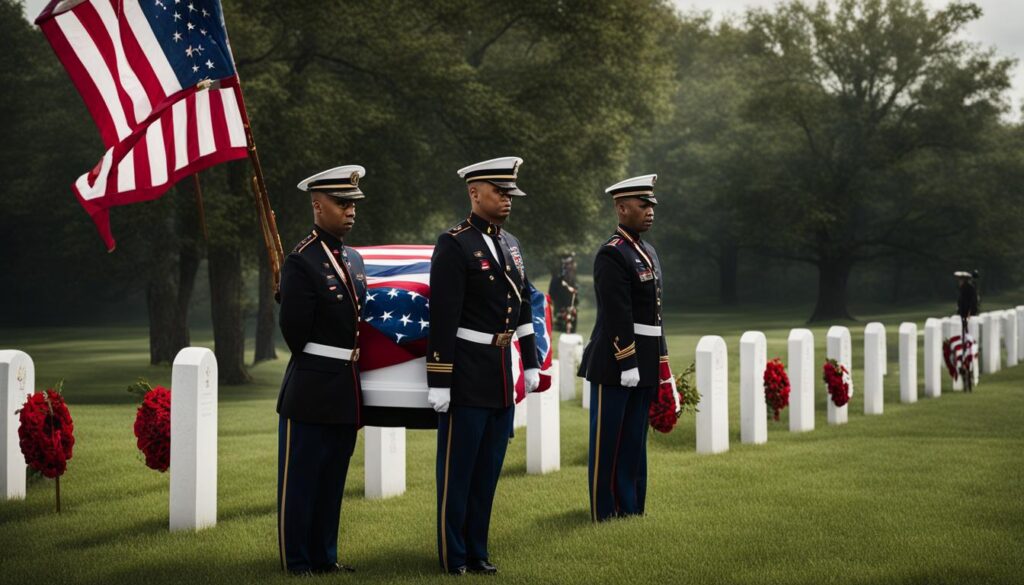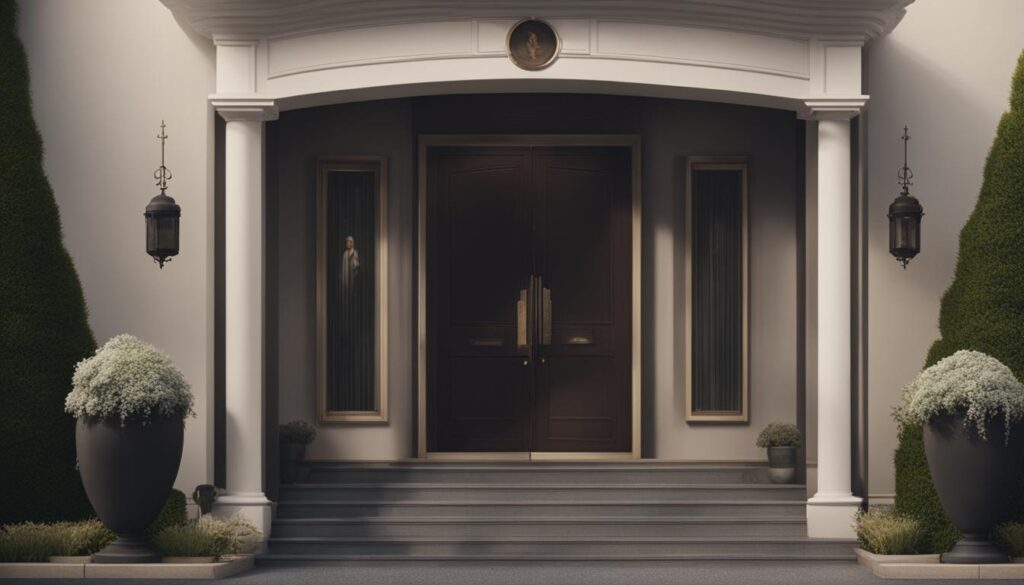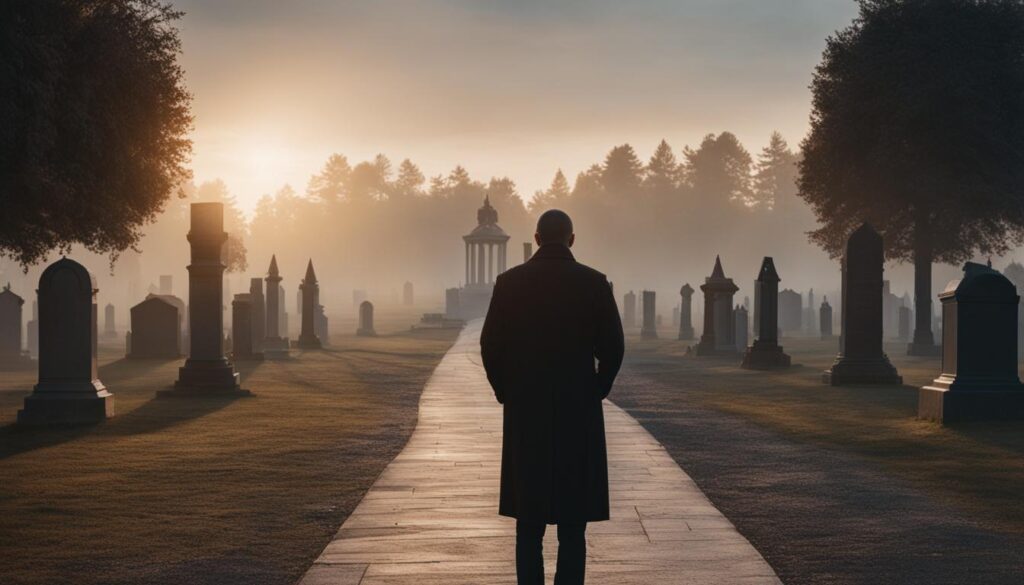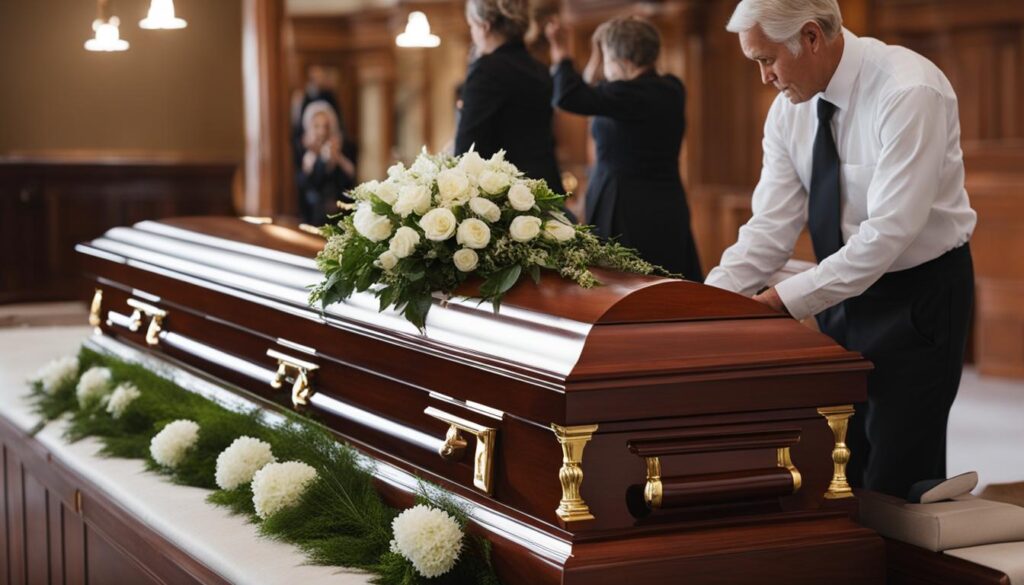We may earn money or products from the companies mentioned in this post.
Military funeral honors are a way to show respect, gratitude, and honor to our American servicemen who have served and sacrificed for our country. These traditions, customs, and ceremonies carry great significance, not only for the families of the fallen but also for the military community as a whole.
As a professional copywriting journalist, it is important to provide an in-depth guide to the Military Funeral Honors Program, from the protocol to the ceremony and customs. In this article, we will explore the key aspects of military funeral honors, including their significance, the program, the protocol, and the ceremony.
Key Takeaways:
- Military funeral honors are a way to show respect, gratitude, and honor to our American servicemen
- The Military Funeral Honors Program involves specific protocols and procedures
- A Military Funeral Honors Coordinator plays an important role in ensuring that all necessary protocols are followed
- The traditional ceremony includes the folding and presentation of the flag, the playing of Taps, and the firing of volleys
- Honoring our American servicemen is an important duty that carries great significance to the military community as a whole
Understanding the Military Funeral Honors Program
The Military Funeral Honors Program is a way to pay tribute to the brave men and women who have served in our nation’s military. This program provides a final salute to the deceased veteran and expresses the gratitude of the nation for their service.
The military funeral honors detail is responsible for carrying out the honors ceremony. This detail usually consists of a minimum of two uniformed military personnel, with at least one member from the deceased veteran’s branch of service. The detail is responsible for folding and presenting the American flag to the next of kin, playing Taps, and conducting the rifle salute, among other duties.
The military funeral honors team is responsible for ensuring that the program is carried out with dignity and respect. They ensure that all protocols and procedures are followed, and that the ceremony is executed flawlessly. The team also provides support and assistance to the family of the deceased veteran.
Protocols and Procedures
The Military Funeral Honors Program follows specific protocols and procedures to ensure that the ceremony is executed with precision and respect. These include:
- Arriving at the ceremony location at least 30 minutes prior to the start time
- Saluting the flag-draped casket upon arrival and departure
- Performing the ceremony with military bearing and attention to detail
- Conducting the rifle salute with a minimum of three volleys
- Presenting the American flag to the next of kin with the utmost care and reverence
The Role of the Military Funeral Honors Coordinator
Having a military funeral honors coordinator is essential to ensuring that all necessary protocols are followed. The coordinator is responsible for arranging the details of the ceremony, including the scheduling, location, and personnel involved. They are also responsible for coordinating with the family of the deceased veteran to ensure that their wishes are respected and that the ceremony is conducted according to their preferences.
Recognizing Military Funeral Honors Protocol
When it comes to military funeral honors, there are specific protocols and customs that should be followed to pay proper respect to our fallen heroes. To ensure that these protocols are carried out correctly, it’s essential to have a military funeral honors coordinator present. This individual is responsible for overseeing the entire ceremony and ensuring that all necessary protocols are observed.
The military funeral honors coordinator is typically a member of the military or a veteran who has extensive knowledge of military funeral protocols. They work closely with the family of the deceased and the funeral director to plan the ceremony and ensure that all military honors are carried out according to tradition.
Some of the protocols that the coordinator oversees include the folding and presentation of the flag, the playing of Taps, and the firing of volleys. These customs are steeped in history and have been carried out for generations to honor the sacrifice of American servicemen and women.
“The ceremony of the laying of the wreath at a veteran’s grave is the final tribute of a grateful nation and can be traced back to ancient times when a wreath of laurel was placed on the head of a triumphant gladiator.” – American Legion
Other customs observed during military funeral honors include the solemn procession of the casket, the recitation of prayers or Bible verses, and the presentation of medals and awards earned by the deceased. Each of these customs plays an essential role in honoring our fallen heroes and their service to our country.
Overall, recognizing military funeral honors protocol is crucial to ensure that our servicemen and women are honored with the respect and dignity they deserve. With the help of a qualified military funeral honors coordinator, families can rest assured that every detail of the ceremony will be carried out according to tradition.
Ceremony and Customs of Military Funeral Honors
The ceremony and customs of military funeral honors are steeped in tradition and respect for the fallen hero. The ceremony serves as a reminder of the bravery, dedication and sacrifice of our American servicemen and women. Here is a step-by-step breakdown of the ceremony and the customs observed during a military funeral honors:
| Step | Activity |
|---|---|
| 1 | The funeral cortege arrives at the cemetery or burial site. |
| 2 | The military funeral honors detail greets the family, explains the ceremony’s sequence to the next of kin, and offers condolences. |
| 3 | The casket is moved to the gravesite while the mourners follow. |
| 4 | The military funeral honors detail moves to the gravesite and positions themselves in accordance with the protocol. |
| 5 | The Honor Guard disassembles the flags that draped the casket, carefully folding them to present to the next of kin. |
| 6 | The rifle team fires a three-volley salute, a tribute that dates back to the 17th century and signifies the end of the fighting and the peace that follows. |
| 7 | The bugler or an electronic recording plays Taps, a bugle call played at military funerals and events to honor those who died in service to their country. |
| 8 | The Folded Flag is presented to the next of kin with the words, “On behalf of the President of the United States, the United States Army, the United States Marine Corps, the United States Navy, and the United States Air Force, please accept this flag as a symbol of our appreciation for your loved one’s honorable and faithful service.” |
| 9 | The military funeral honors detail moves away, allowing the family time to grieve and pay their final respects. |
In addition to the ceremony, there are other customs and traditions observed during military funeral honors. Here are some of the customs:
- The casket is draped with an American flag to signify the deceased’s service to their country.
- During the ceremony, only the immediate family members can be present at the graveside.
- The firing of volleys is always done in odd numbers, usually three or seven, to signify the Holy Trinity or the seven articles of the Military Code of Conduct.
- The playing of Taps is a sign of respect and gratitude for the fallen service members and also signifies the end of the day or the end of service.
In conclusion, the ceremony and customs of military funeral honors serve as a reminder of the ultimate sacrifice made by our American servicemen and women. It is a way to honor their bravery and dedication to their country. By observing these traditions, we show our gratitude and respect for their service and sacrifice.
Conclusion
As we come to the end of this guide to military funeral honors, we are reminded of the significance of these traditions, customs, and ceremonies, and the importance of honoring our American servicemen. The Military Funeral Honors Program is a solemn and respectful tribute to those who have served our country, and it is our duty to ensure that their sacrifice is properly recognized and commemorated.
Through understanding the details of the Military Funeral Honors Program, recognizing the protocol involved, and appreciating the ceremony and customs, we gain a deeper understanding of the sacrifice and dedication of our fallen heroes and their families.
It is essential that we continue to honor our service members and their families with the respect and dignity that they deserve. Let us remember those who have given their lives for our freedoms and never forget their sacrifice.
FAQ
What is the purpose of military funeral honors?
The purpose of military funeral honors is to show the nation’s gratitude and respect for the deceased’s service to the country. It is a way to honor and remember their sacrifice.
Who is responsible for carrying out military funeral honors?
The military funeral honors detail, which consists of members from the deceased’s branch of service, is responsible for carrying out the honors. They follow specific protocols and procedures to ensure a dignified and respectful ceremony.
What are the specific protocols involved in a military funeral honors ceremony?
Some of the specific protocols involved in a military funeral honors ceremony include the folding and presentation of the flag to the next of kin, the playing of Taps, and the firing of volleys as a salute. These protocols vary slightly depending on the branch of service.
What is the role of a military funeral honors coordinator?
A military funeral honors coordinator ensures that all necessary protocols are followed during the ceremony. They work closely with the deceased’s family, the funeral home, and the military funeral honors detail to coordinate the details and ensure a smooth and respectful ceremony.
What other customs and traditions are observed during military funeral honors?
In addition to the key protocols, other customs and traditions observed during military funeral honors include the playing of military hymns and songs, the presence of honor guards, and sometimes the use of ceremonial items such as rifle caskets or horse-drawn caissons.
Affiliate Disclosure: This post may contain affiliate links. If you purchase through our link, we may receive a small commission, but at no additional cost to you. For more information, please see our Disclosure statement.



